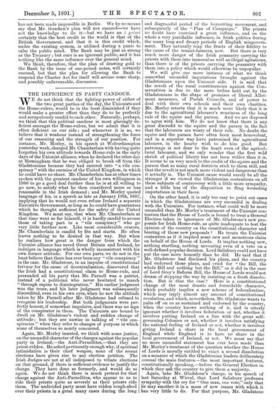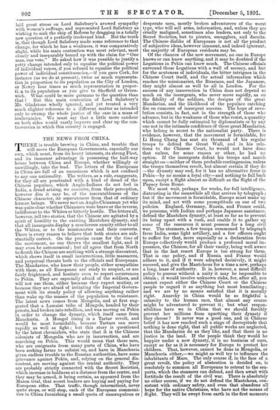THE DEFICIENCY IN PARTY CANDOUR.
WE do not think that the fighting-power of either of the two great parties of the day, the Unionists and the Home-rulers, would be in the least diminished if they would make a greater effort than they do to be perfectly and scrupulously candid to each other. Naturally, perhaps, we think that this political candour is most glaringly de- ficient amongst the Home-rulers, but we admit that it is often deficient on our side ; and whenever it is so, we believe that it weakens instead of strengthening the force of our reasoning and the strength of our position. For instance, Mr. Morley, in his speech at Wolverhampton yesterday week, charged Mr. Chamberlain with having quite forgotten his own attitude towards Home-rule in the early days of the Unionist alliance, when he declared the other day at Birmingham that he was obliged to break off from the Gladstonians because they had entered into " a vile con- spiracy " with the enemies of the United Kingdom, in which he could have no share. Mr. Chamberlain has at other times spoken with the greatest candour of his own willingness in 1886 to go a good deal further than he is at all willing to go now, to satisfy what he then considered more or less reasonable in the Irish demand ; and Mr. Morley quoted language of his, in a speech as late as January 19th, 1887, implying that he would not even refuse Ireland a separate Executive Government, so long as he could have guarantees which he thought sufficient for the safety of the United Kingdom. We must say, that when Mr. Chamberlain at that time went so far himself, it is hardly candid to accuse those of taking part in a " vile conspiracy " who go very little further now. Like most considerable orators, Mr. Chamberlain is candid by fits and starts. He often leaves nothing to be desired in that way. But when he realises how great is the danger from which the Unionist alliance has saved Great Britain and Ireland, he indulges in language which is wholly inconsistent with his own former attitude. For our own parts, we do not in the least believe that there has ever been any " vile conspiracy " in the case. Mr. Gladstone, in an impulse of constitutional fervour, for the cause of decentralisation, discovered that the Irish had a constitutional claim to Home-rule, and persuaded all his party that Mr. Parnell was a patriot, instead of a politician who never hesitated to march " through rapine to disintegration." His earlier judgment was the truer, and his later judgment was subsequently discredited, even in his own eyes, when he saw the attitude taken by Mr. Parnell after Mr. Gladstone had refused to recognise his leadership. But both judgments were per- fectly honest, if somewhat impulsive, and there was no sign of the conspirator in them. The Unionists are bound to dwell on Mr. Gladstone's violent and sudden change of attitude ; but they are unwise in talking of " vile con- spiracies " when they refer to changes of purpose in which some of themselves so nearly concurred.
Again, Mr. Morley insisted, we think with some justice, on the uncandid character of the charges against the popular party in Ireland,—the Anti-Parnellites,—that they are priest-ridden. He asked pertinently enough why, if spiritual intimidation is their chief weapon, none of the recent elections have given rise to any election petition. The Irish Judges are not at all indisposed to vitiate elections on that ground, if there is sufficient evidence to justify the charge. They have done so formerly, and would do so again. We do not think there is much pretext for that charge against the Anti-Parnellites, who appear to us to ride their priests quite as severely as their priests ride them. The undivided party must have ridden rough-shod over their priests in a great many cases during the long and disgraceful period of the boycotting movement, and subsequently of the " Plan of Campaign." The priests no doubt have exercised a great influence, and on the whole a very justifiable influence, in Irish politics during the many long and dreary periods of English misgovern- ment. They naturally reap the fruits of their fidelity to the cause of the tenant-farmers, now. But there is very much more danger of the Irish peasantry carrying the priests with them into immoral as well as illegal agitations, than there is of the priests carrying the peasantry with them into a policy which would otherwise be unpopular. We will give one more instance of what we think somewhat uncandid imputations brought against the Gladstonians upon the Unionist side. It is said that the revolt of the rural constituencies against the Con- servatives is due to the mere bribes held out by the Gladstonians in the shape of promises of liberal Allot- ment measures, of Parish Councils, and of power to deal with their own schools and their own charities. Mr. Morley retorts that it is much more likely that it is due to the agricultural labourer's weariness of the long rule of the squire and the parson. And we are disposed to agree with him. We do not know that there is any great discredit to the squire and the parson in the fact that the labourers are weary of their rule. No doubt the squire and the parson have often been most benevolent, and in a superior way have patronised the agricultural labourer, in the hearty wish to do him good. But patronage is not dear to the heart even of the agricul- tural labourer, and we only wonder that the first wild. shriek of political liberty has not been wilder than it is. It seems to us very much to the credit of the squire and the parson that so many rural districts stick to them still, and that the revolt is not much more violent and dangerous than it actually is. The Unionist cause would surely be all the stronger if we viewed the Gladstonian contentions on all these subjects of controversy with a little more sympathy, and a little less of the disposition to fling wounding imputations in their faces.
On the other hand, it is only too easy to point out cases in which the Gladstonians are very uncandid in dealing with the Unionists. For instance, what could well be more uncandid than Mr. Morley's treatment of the Unionist con- tention that the House of Lords is bound to treat a General Election taken in ignorance of Mr. Gladstone's new pro- posals for Irish Home-rule, as quite inadequate to test the opinion of the country on the constitutional character and bearing of those new proposals ? He treats the Unionist contention as if it implied some new and monstrous claim on behalf of the House of Lords. It implies nothing new„ nothing startling, nothing savouring even of a veto on a, well-defined popular decision. Lord Salisbury could not have put the case more honestly than he did. He said that if Mr. Gladstone had disclosed his plans, and the country had endorsed those plans, and cried for " the Bill, the whole Bill and nothing but the Bill," as it did in the case of Lord Grey's Reform Bill, the House of Lords would not dream of stopping the way by insisting on a fresh dissolu- tion. But is that the case ? Here is a constitutional change of the most drastic and formidable character,. which probably implies a new scheme of federalisation,. which may imply almost any amount of constitutional revolution, and which, nevertheless, Mr. Gladstone wants to palm off on us as sustained and endorsed by the country,. when the country knows nothing of it, and is utterly ignorant whether it involves federation or not, whether it involves putting Ireland on a line with the great self- governing Colonies or not, whether it involves satisfying the national feeling of Ireland or not, whether it involves giving Ireland a share in the local government of England while England is to have no share in the local government of Ireland, or not. We must say that no more uncandid statement has ever been made than Mr. Morley's treatment of the question whether the House of Lords is morally entitled to exact a second dissolution on a measure of which the Gladstonian leaders deliberately conceal the main features,—the most important features, constitutionally speaking,—before the General Election in which they ask the country to give them a majority. Again, take Mr. Gladstone's charge, in his speech of last Saturday at Wirral, that Lord Salisbury professes sympathy with the cry for " One man, one vote," only that he may smother it in a mass of new issues with which it has very little to do. For that purpose, Mr. Gladstone laid great stress on Lord Salisbury's avowed sympathy with women's suffrage, and represented Lord. Salisbury as wishing to sink the ship of Reform by dragging in a totally new question of a perfectly irrelevant kind. But the truth is, that though Lord Salisbury made some reference to that change, for which he has a weakness, it was comparatively slight, while his main contention was most relevant, most closely and inseparably bound. up with the claim for "One man, one vote." He asked how it was possible to justify a petty change intended only to equalise the political power of individual voters, if you refused to equalise the political power of individual constituencies,—if you gave Cork, for instance (as we do at present), twice as much representa- tion in proportion to its population as the City of London, or Newry four times as much representation in propor- ticn to its population as you give to Sheffield or Green- wich. What could be more germane to the question than that ? But this main contention of Lord Salisbury's Mr. Gladstone wholly ignored, and yet treated a very much slighter reference to a different matter as intended. only to swamp the whole justice of the case in a mass of irrelevancies. We must say that a little more candour on both sides would vastly improve and clear up the con- troversies in which this country is engaged.



















































 Previous page
Previous page